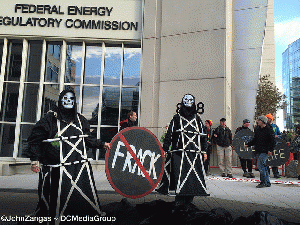During the first week of November, hundreds of people from around the country flocked to a little-known federal agency on First Street in Washington, DC. Each with their own story of tainted water and air, health problems, fear for their lives and communities, and concern for the climate, they followed a path to the source of their troubles: the Federal Energy Regulatory Commission (FERC).
Maggie Henry, a farmer from Ohio, pointed the finger at FERC for approving a natural gas pipeline on the farm her family has worked for 100 years. "I'm here all week, because [FERC is] rubberstamping these permits without taking anything into account," said Henry. "There is a 40" transmission line that is 30 feet outside my front door. In March, we had a 4.0 earthquake. I was two miles from that epicenter. My drywall is cracked, the integrity of my basement wall is gone. It leaks like a sieve in the rain."
Among its responsibilities, FERC reviews applications for interstate natural gas pipelines, liquefied natural gas (LNG) terminals and other gas infrastructure. If natural gas is leaking into Maggie Henry's basement (and all gas pipelines leak), she's right to be afraid--it could explode. Accidents involving gas pipelines are not rare. According to federal agency PHMSA, there have been 552 incidents so far in 2014, resulting in 15 fatalities and 90 injuries. And there are lots more pipelines on the way.
More Infrastructure, More Fracking
All of these major projects, even with mitigation, are problematic for health, safety and environmental reasons. The Cove Point terminal, for example, is located in the middle of a highly populated area, where the risks of highly volatile LNG are compounded by squeezing a power plant and liquefaction train into a small site. The geological instability of the salt caverns at Seneca Lake threatens the water supply of 100,000 people. The Constitution Pipeline cuts through forests, farmlands, and wetlands. And all of this new and improved infrastructure makes it possible to transport more gas obtained by fracking.
Questionable Need
"I'm angry at FERC because I've seen Cove Point. I have friends who live in Seneca Lake," said protestor Sean Glenn. "These are real people dealing with these pipelines, export terminals they're approving and they're not thinking of the people in the communities. Cove Point is not even for American jobs or Energy Communities. None of it makes sense. It's endangering communities and lives."
Many people question whether these gas infrastructure projects are even necessary. "FERC just fast-tracked the pre-filing for the Tennessee Gas Pipeline that's slated to go to Massachusetts, a project that's not needed and would put 2.2 billion cubic feet of gas per day through the state," said protestor Dineen O'Rourke.
In Whose Interest?
FERC concludes that the projects it approves are necessary, but the question is, necessary for whom?
The Natural Gas Act confers authority on FERC to determine whether a project is "required by the present or future public convenience or necessity." Along with its broad discretionary powers, FERC must also be "a guardian of the public interest," as one court interpreted its role. If you define "public interest"--in a common sense way--as the health and well-being of citizens and their environment, and "public convenience and necessity" as projects which citizens require to serve their own energy needs (taking into consideration the drastic consequences of burning fossil fuels), then indeed, FERC's actions make no sense.
It makes much more sense, however, when you understand how FERC defines "public necessity" and "public interest." A company proposing a project demonstrates need if it has signed agreements for the gas it will process, store or transport. Cove Point LNG is in the public interest from the perspective of the Department of Energy and FERC because its operator, Dominion Resources, has signed contracts with Indian and Japanese gas companies. Because the gas is contracted, the facility is in Americans' interest, even though the export terminal will serve Asian markets, not domestic ones. (Jobs and benefits to the U.S. economy are also considered. The Department of Energy, however, determined that exporting natural gas could cause domestic prices to double by 2040.)
Line Up the Customers
If a company has customers for its project, it has essentially proven need.
In reviewing the application of a compressor station in Myersville, Maryland, FERC determined that it was necessary because, according to a sworn statement from a Dominion Transmission official, it has contracts with two local market providers. Dominion did not even produce the actual contracts, yet determination of need was based on the agreements.
Some of Myersville's residents challenged FERC's decision, but in May, a US District Court ruled against them. Their lawyer, Carolyn Elefant, sees a larger problem. "I think one of the biggest concerns is that the court's decision, if taken to a logical extreme, says that, just because an applicant says that there's a need for a facility, they can build anything anywhere, and there's no check on that," she said after oral arguments in the appeal of Myersville's case.Deceptive Practices
Ultimately, contracts aren't binding. In a couple of years, Dominion could cancel the contracts for the Myersville compressor in favor of more lucrative offers. Myersville residents claim that Dominion Transmission has been deceptive about the purpose of the compressor station. Once Cove Point LNG is up and running, they say, the compressor will be used to help transport gas there.
(Note: You can view every article as one long page if you sign up as an Advocate Member, or higher).





